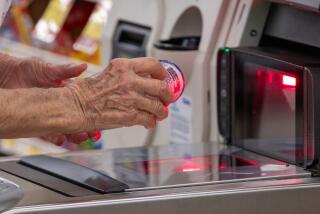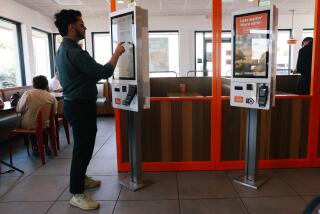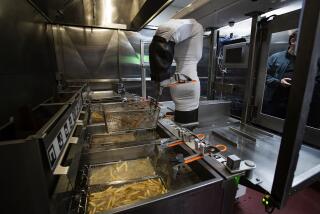SERVICE WITH A GLOW : Take a Number. Stand in Line. At Least Machines Are Programmed to Please.
- Share via
I was at my cash machine late last night. It was a cozy scene--just me, the machine and, a few feet away, the homeless people who live between the money dispensary and the nearest crosswalk (homeless people may be down on their luck, but they’re no dummies).
The transaction was a model of late 20th-Century tech: card in, touch a few buttons, cash out, wham bam, thank you, Diebold. Just before the machine relinquished my card and issued a receipt, the screen glowed with this message: “Thank you, Harry J. Shearer. It was a pleasure serving you.”
If pleasure was, in fact, experienced, who enjoyed it? Obviously, there’s no who involved here. Whatever pleasure was felt occurred deep within some Intel microprocessor. Can chips be pleased by serving?
More crucially, can people? It doesn’t take an indiscreet Japanese legislator scolding Americans for our laziness to remind us that this country stopped being a manufacturing colossus right around the time that Joe Piscopo became a household word. The good news, the economic mullahs said back then, was that the obsolete, dirty-fingernail, unionized, thing-making jobs would be replaced by millions of clean new jobs in the fast-growing field of service.
We’ve become a nation of burger-flippers, the doom-and-gloom crowd says. Personally, I don’t eat burgers. But, after a few recent bouts of modern American service, I’d say we’ve moved that good, old “Who gives a rat’s ass?” attitude straight over from the assembly line to the customer service department.
For example, there’s a supermarket chain that boasts that, if ever in your life more than three people are waiting in your checkout line, another will be opened forthwith. Well, I’m the last person on Earth to disagree with Stephanie Edwards, but in the real world, this policy is suspended whenever there’s a shift change. If you’re unlucky enough to need milk at shift-change time, you could be waiting in line until the Muzak plays Anthrax.
Since you have to pass by the cash register--unless, of course, you’re shoplifting or just looking--that position has become a crucial choke point in the service industry’s war against the customer. Cashiers at many different retailers have a technique that’s activated whenever a sizable line forms--an appreciable number of people hoping to pay for their little purchases and make it back to the parking lot before their cars are stolen by the itinerant window-washers. This is when the checkout people go into some strange inventory mode, counting every quarter in their cash drawer, giving each dollar bill in their temporary custody a pet name. Whatever they’re doing, service it ain’t.
A well-known local discount chain sells an “extended warranty” with its appliances. Try to make good on that warranty, and you’ll wait in line at a customer service desk. When your number is called, your description of the problem will be met with a friendly, uncomprehending stare and the command to take the appliance to the part of the store where you bought it--where, of course, you have to take a number and wait all over again. This happens to you because they sold you something that doesn’t work and charged you extra for the privilege of being double-lined.
Everyone has his favorite horror stories: cable outfits that agree to make service calls only if you promise to quit your job and wait at home for a month, companies whose customer service representatives don’t speak English, factory service techs who slam their company’s product by advising you, “It’s not even supposed to do that,” rather than taking the time to fix it. The feeling begins to dawn that it’s not a pleasure serving us.
We are being prepared by all this sullenness and surliness to actually prefer dealing with machines. And, just beyond the service society lies the domain ruled by chips, the information society. The machines know how to thank us for using AT&T;, and they don’t take shift changes. Yes, they crash from time to time, but when they come back on-line, they thank us for waiting. By name. When the service jobs have all gone to Korea, too, the machines can suggest what we might next do for a living. And for them it will be a pleasure.
More to Read
Inside the business of entertainment
The Wide Shot brings you news, analysis and insights on everything from streaming wars to production — and what it all means for the future.
You may occasionally receive promotional content from the Los Angeles Times.










